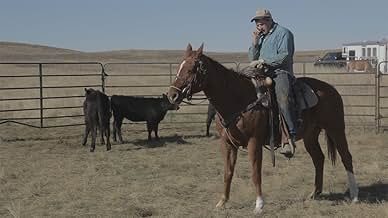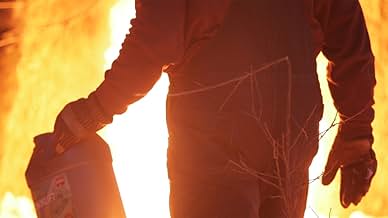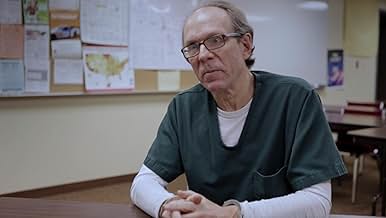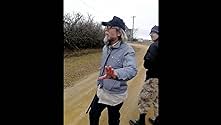NOTE IMDb
6,9/10
4,6 k
MA NOTE
Ajouter une intrigue dans votre langueWhen a noted white supremacist moves into their town, the residents of Leith, North Dakota do what they can to prevent him from taking control of the municipality.When a noted white supremacist moves into their town, the residents of Leith, North Dakota do what they can to prevent him from taking control of the municipality.When a noted white supremacist moves into their town, the residents of Leith, North Dakota do what they can to prevent him from taking control of the municipality.
- Réalisation
- Scénario
- Casting principal
- Récompenses
- 8 victoires et 31 nominations au total
Avis à la une
The people that made "Welcome to Leith" did a nice job of presenting a reasonably well balanced and interesting story. While they obviously didn't like the white supremacists featured in the film, they also were sure to present the complete story...warts and all.
The town of Leith is extremely tiny and located in the Dakotas. When a crazed white supremacist arrives there and starts buying up property, folks start getting concerned. When he then starts inviting in other like-minded jerks, the town starts to react...strongly. What follows is a film that consists of showing the tiny town's efforts to get rid of the supremacists and prevent them from taking over Leith. Unfortunately, when the neo-Nazis actually do something that might be illegal, some of the townsfolks manage to undo the state's case by talking out of turn...and some of these people later blame the state for the case falling apart. However, the way I saw the film I don't believe the authorities LEGALLY had much more they could do about the supremacists...and the film leaves everything in limbo. This could REALLY benefit from a follow-up to know what subsequently occurred.
As I mentioned, the people who made the film were great--they were very thorough and did a wonderful job in presenting both sides. It's not 100% satisfying to watch, however, for two reasons. First, in real life things often DON'T work out perfectly...as the film illustrates. And, Second, despite 99.9% of the viewers wanting to see these neo-Nazis die or go to prison forever, legally this wasn't possible due to Constitutionally guaranteed rights...even the right to be an evil, nasty, hateful individual! To me this isn't a bad thing...everyone deserves protection--whether or not they are nice people...though I am sure many will be angered by this. Despite its shortcomings, it does make for an interesting documentary as well as a great civics lesson.
The town of Leith is extremely tiny and located in the Dakotas. When a crazed white supremacist arrives there and starts buying up property, folks start getting concerned. When he then starts inviting in other like-minded jerks, the town starts to react...strongly. What follows is a film that consists of showing the tiny town's efforts to get rid of the supremacists and prevent them from taking over Leith. Unfortunately, when the neo-Nazis actually do something that might be illegal, some of the townsfolks manage to undo the state's case by talking out of turn...and some of these people later blame the state for the case falling apart. However, the way I saw the film I don't believe the authorities LEGALLY had much more they could do about the supremacists...and the film leaves everything in limbo. This could REALLY benefit from a follow-up to know what subsequently occurred.
As I mentioned, the people who made the film were great--they were very thorough and did a wonderful job in presenting both sides. It's not 100% satisfying to watch, however, for two reasons. First, in real life things often DON'T work out perfectly...as the film illustrates. And, Second, despite 99.9% of the viewers wanting to see these neo-Nazis die or go to prison forever, legally this wasn't possible due to Constitutionally guaranteed rights...even the right to be an evil, nasty, hateful individual! To me this isn't a bad thing...everyone deserves protection--whether or not they are nice people...though I am sure many will be angered by this. Despite its shortcomings, it does make for an interesting documentary as well as a great civics lesson.
This film definitely gets the conflict: a dying town receives new arrivals who they do not want. We see a lot of bad behavior, without seeing how it came about. We hear a lot about how people feel -- but not how they got there. We see a lot of things, but we don't see the causes; we can only accept what the film shows us.
In this way, "Welcome to Leith" is very much a shaped film about real people in a real event. Sympathy clearly exists for the townspeople, but we are also given good exposure to the newcomers, who present their views openly. Unexplored is how the behavior of the good townspeople is often worse than that of the prejudiced newcomers -- or is it? We don't know, but in this film we see property destruction only by one side, and it's not the newcomers.
Making issues more complicated, the arguments given by the old-timers only tangle things further; we can imagine the same arguments happening in dying white towns receiving new non-white occupants. Sure, the answer feels obvious to all of us -- but you can't argue a feeling into a legal action ... or can you?
Perhaps the filmmakers realized all this; the title alone is ironic, since clearly the town of Leith is *not* welcoming these people. But in a free democracy, property up for sale can be bought by anyone interested. What we haven't figured out how to manage, is how to balance the rights of the existing inhabitants with those of the newcomers. "Welcome to Leith" shows this problem is still very much alive -- regardless of which side of the Sold sign you're standing on
In this way, "Welcome to Leith" is very much a shaped film about real people in a real event. Sympathy clearly exists for the townspeople, but we are also given good exposure to the newcomers, who present their views openly. Unexplored is how the behavior of the good townspeople is often worse than that of the prejudiced newcomers -- or is it? We don't know, but in this film we see property destruction only by one side, and it's not the newcomers.
Making issues more complicated, the arguments given by the old-timers only tangle things further; we can imagine the same arguments happening in dying white towns receiving new non-white occupants. Sure, the answer feels obvious to all of us -- but you can't argue a feeling into a legal action ... or can you?
Perhaps the filmmakers realized all this; the title alone is ironic, since clearly the town of Leith is *not* welcoming these people. But in a free democracy, property up for sale can be bought by anyone interested. What we haven't figured out how to manage, is how to balance the rights of the existing inhabitants with those of the newcomers. "Welcome to Leith" shows this problem is still very much alive -- regardless of which side of the Sold sign you're standing on
This documentary speaks volumes and is very relevant to America in 2016-2018 with what is happening in the news.
This should be shown in every school to help fight hatred and learn how to stand up to them. Kudos to the producers for making such an important piece and getting it out there
This should be shown in every school to help fight hatred and learn how to stand up to them. Kudos to the producers for making such an important piece and getting it out there
This is the documentary about the inhabitants of Leith, a small village/town in North Dakota.
After finding out that Craig Cobb, a well known and infamous neo nazi are buying as much land as he possibly can in order to create some sort of village for his like minded, mentally challenged people aka other neo nazis.
Basically, Cobb is trying to take over Leith.
It starts off pretty calmly, but after a while Cobb and his minions start to walk "patrols" in this small community while being armed with assault rifles and things escalate quicky. The movie is not only a testament to how hard the residents of Leith fought to get rid of a potentially dangerous group of individuals but it also gives a glimpse inside the narrow mind of Cobb and his followers. Why they would let themselves be portrayed like this for the world to see is beyond me, but in my experience alt-righters and neo nazis aren't very intelligent to begin with. If you haven't watched this, i recommend it strongly.
The negative reviews comes from deplorables who's afraid and/or ashamed of the truth. This movie is extremely well made, it's unbiased and we get to see both sides of the situation.
It starts off pretty calmly, but after a while Cobb and his minions start to walk "patrols" in this small community while being armed with assault rifles and things escalate quicky. The movie is not only a testament to how hard the residents of Leith fought to get rid of a potentially dangerous group of individuals but it also gives a glimpse inside the narrow mind of Cobb and his followers. Why they would let themselves be portrayed like this for the world to see is beyond me, but in my experience alt-righters and neo nazis aren't very intelligent to begin with. If you haven't watched this, i recommend it strongly.
The negative reviews comes from deplorables who's afraid and/or ashamed of the truth. This movie is extremely well made, it's unbiased and we get to see both sides of the situation.
Welcome to Leith was well-received at its showing at Austin's SXSW Film Festival. The film documents the peculiar events that occurred in 2013-2014 when a nationally-known white supremacist Craig Cobb moves to tiny Leith, North Dakota (population: 24) with a plan to buy up land and take over city government and make it into some sort of center of white supremacy. Once alerted by the Southern Poverty Law Center (SPLC) the ordinary town folks mobilize to fight back and save their town from Cobb's nefarious plan.
The odd part of the story is that Cobb's plan seems to be legal. (When he and his partner are finally arrested they almost seem to have been provoked.) There is nothing illegal about buying land and moving into a town. And the first amendment allows him to express his beliefs and fly his Nazi flags no matter how evil and offensive those beliefs may be. The town residents actually seemed to be making excuses to get rid of him such as citing him for not having running water and a sewage system on his property.
Fundamentally, the film asks the question is democracy about the community making decisions by the will of the majority or is there a basic set of minimum beliefs about human equality that are necessary prerequisites to participate in democratic society? The majority of the town seemed to decide – really quite reasonably - that Cobb's noxious beliefs were so anti-egalitarian that they didn't want him and his cronies to live in their town. They are in some sense intolerant of his intolerant beliefs, but one can hardly blame them.
Welcome to Leith is beautifully filmed and the filmmakers maintain an impressive level of objectivity about their offensive subject. They let his evil beliefs discredit themselves rather than trying to paint Cobb as anything more than the pathetic nasty creature that he is. The townspeople come off as genuine and human. Perhaps it is a positive sign that this sort of racism is unacceptable even in one of the smallest most isolated corners of the United States. I hope that Welcome to Leith gets widely distributed so that many more people can enjoy this powerful film.
The odd part of the story is that Cobb's plan seems to be legal. (When he and his partner are finally arrested they almost seem to have been provoked.) There is nothing illegal about buying land and moving into a town. And the first amendment allows him to express his beliefs and fly his Nazi flags no matter how evil and offensive those beliefs may be. The town residents actually seemed to be making excuses to get rid of him such as citing him for not having running water and a sewage system on his property.
Fundamentally, the film asks the question is democracy about the community making decisions by the will of the majority or is there a basic set of minimum beliefs about human equality that are necessary prerequisites to participate in democratic society? The majority of the town seemed to decide – really quite reasonably - that Cobb's noxious beliefs were so anti-egalitarian that they didn't want him and his cronies to live in their town. They are in some sense intolerant of his intolerant beliefs, but one can hardly blame them.
Welcome to Leith is beautifully filmed and the filmmakers maintain an impressive level of objectivity about their offensive subject. They let his evil beliefs discredit themselves rather than trying to paint Cobb as anything more than the pathetic nasty creature that he is. The townspeople come off as genuine and human. Perhaps it is a positive sign that this sort of racism is unacceptable even in one of the smallest most isolated corners of the United States. I hope that Welcome to Leith gets widely distributed so that many more people can enjoy this powerful film.
Le saviez-vous
- ConnexionsEdited into Op-Docs: Separatist (2015)
Meilleurs choix
Connectez-vous pour évaluer et suivre la liste de favoris afin de recevoir des recommandations personnalisées
- How long is Welcome to Leith?Alimenté par Alexa
Détails
- Date de sortie
- Pays d’origine
- Site officiel
- Langue
- Aussi connu sous le nom de
- Witajcie w Leith
- Lieux de tournage
- Sociétés de production
- Voir plus de crédits d'entreprise sur IMDbPro
Box-office
- Montant brut aux États-Unis et au Canada
- 36 010 $US
- Week-end de sortie aux États-Unis et au Canada
- 3 707 $US
- 13 sept. 2015
- Montant brut mondial
- 36 380 $US
- Durée1 heure 25 minutes
- Couleur
Contribuer à cette page
Suggérer une modification ou ajouter du contenu manquant

Lacune principale
By what name was Welcome to Leith (2015) officially released in India in English?
Répondre




































